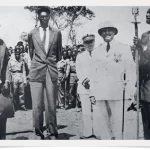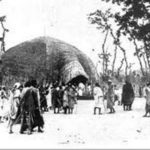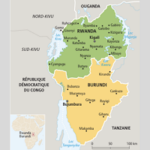The Administration of Rwabugiri on Ijwi
Ijwi under its Havu king had always been independent of Rwanda ritually, politically and militarily. However, both ritually and politically there were indeed royal elements similar to those in Rwanda—perhaps introduced by immigrants to Ijwi but more likely drawn (both on Ijwi and in Rwanda) from a deeper, common cultural source.To the Bany’Iju, this was a fact of their royal heritage, but it was considered a symbolic representation of their historical past rather than subordination. They viewed their king as a “brother” to the Rwandan king, as tothem all kings were brothers, not clients. To Rwandans, the relationship between the Ijwi and Rwandan kings was manifested in the payments, which the Rwandan court saw as tribute and which they interpreted as the expression of a clientship status. In the eyes of the Rwandan king, at least of Rwabugiri, it was clearly an important statement of the preeminence of Rwanda.
The restitution of this status of subordination, as Rwabugiri obviously chose to interpret it, became the major objective of his administration on Ijwi. But aside from that, what is remarkable is the continuity in patterns of administration on Ijwi. Before his death, Nkundiye wielded ultimate authority in the south, and Rwabugiri seems willingly to have let him do so. Administration remained largely in the hands of the Bany’Iju at all levels, and those who had served as close advisors to Kabego were often retained under Nkundiye. There do not appear to have been any reprisals against the local leaders and second-tier political leadership. With the exception of members of the royal family and their close friends who had fled, the authority structure remained intact and the authorities remained unchanged. This pattern indicates that political identification with the institutions of the political structure was stronger than was personal allegiance. It suggests that many positions of authority, even those delegated from above, were seen less as administrative than as representative—to pay court and to petition the king on behalf of the people. A change in the king thus did not affect their position.
During the second period, following the death of Nkundiye, the character of Rwandan rule changed. Rwandan chiefs were placed on the island,and the highest levels of political and administrative authority were removed from Havu control, though Rwabugiri did retain important Havu advisors on the island. During this period there seemed to be a more conscious attempt to tie Ijwi closer politically and symbolically to the Rwandan king. Rwabugiri himself spent some time on the island. He built at least three residences and had at least two wives there (at different times). He also brought one of his royal bulls, Fizi,to Ijwi. A small number of Bany’Iju were recruited as rowers, and a few important warriors fought in his ranks in Bushi. That there were some individuals who sought to identify with Rwandan court culture is illustrated in the work by A. Kashamura,but Ijwi accounts make it clear that this was nowhere near as generalized—nor as enduring—as he implies.
The population seemed but slightly affected by this loss of independence. Their obligations remained largely the same toward the new chiefs; some served in wars and as rowers for Rwabugiri. The demand on them for material goods does not seem to have been greatly increased, although there was a heavier demandfor labor to construct the new residences. There was no attempt to introduce clientship on the Rwandan pattern here or to settle Rwandans on the island; the number of Rwandan chiefs was always very small. In short, Rwabugiri’s presence brought little change in the people’s lives that is remembered today, and few demographic changes, certainly much less than what occurred with the arrival of the Europeans.
The forms of Rwabugiri’s administration on Ijwi are in some ways reminiscent of his policy in Gisaka, Ndorwa, and Kinyaga in similar circumstances. Yet there remained important differences from the Gisaka model: the limited numbers, powers, and influence (at least as this is today remembered in the traditions) of the Rwandan chiefs on Ijwi; the cultural differences of Ijwi from Rwanda; and (at least today) the clear lack of identification of the population as a whole with Rwandan culture. Rwandan chiefs on Ijwi were not at all influential before the death of Nkundiye; in other words, there was no immediate attempt at direct rule. The superficiality of Rwandan rule is illustrated by the immediate departure of Rwandan chiefs on the death of Rwabugiri, not a sign of successful cultural assimilation after perhaps twenty years of Rwandan political domination. Furthermore, the Rwandan period (for it cannot properly be called an occupation) left no widespread legacy of Rwandan cultural institutions (as, for example, Rwandan forms of clientship).
What is most notable is Rwabugiri’s failure to integrate Ijwi into Rwanda. In fact, this conclusion can be validly applied to other areas west of Rwanda, which were not in the cultural sense already substantially integrated into Rwanda: Bushi, Ijwi, Kalehe, and Buhunde were all defeated by Rwabugiri in battle without being incorporated into Rwanda, though among the western states, Ijwi most closely approached this. These differences (in achievement, if not in goals) between the incorporation of areas of broadly Rwandan culture (Gisaka, Kinyaga, Bwishaza, Ndorwa) and areas of distinct differences from Rwandan culture (Kalehe, Bushi, Buhunde) leads to the conclusion that the lasting effects of Rwabugiri’s military exploits were less pronounced than is generally accepted—more irredentist than imperialist.
On Ijwi there were interesting variants to the basic Rwandan administrative pattern of coopting the local leadership and replacing the ruling elite with a thin overlay of Rwandan chiefs. In one village in the east, Rwabugiri was met by a second-generation Rwandan immigrant: though he himself had been born on Ijwi, his father had immigrated to the island from Rwanda for unstated reasons. On Rwabugiri’s arrival, this man presented himself to Rwabugiri’s court, not far from his village, and was appointed as village headman. Two other unrelated examples demonstrate a similar pattern. Both concern men who had left Ijwi for Rwanda over some social dispute, probably during the period between Rwabugiri’s second and third attacks (i.e., during Nkundiye’s “reign”). Each of them returned with Rwabugiri, after Nkundiye’s death, and was delegated authority in their villages; one of them reemigrated to Rwanda after Rwabugiri’s death. These are the only cases that do not conform to the pattern of cooptation of Bany’Iju at the local level and the appointment of Rwandans as political chiefs at higher levels. The only men directly delegated by Rwabugiri at the lower levels of administration were those who, while depending entirely on the Rwandan king for their position, were not strangers to the Bany’Iju.
The relative immunity of the population to these changes was mirrored in their detachment from events at higher levels. While they had been willing to fight for Kabego, they did not respond similarly in the case of Nkundiye, whom they viewed as an illegitimate king: a “king without drums.” He was a chief with political power, but one lacking the ritual power of kingship. Nkundiye’s at-tempt to attract public support with which to assert his independence against Rwabugiri was clearly a failure. Yet the idea of responsibility to the kingship, even if not personal loyalty to an individual, was not absent. Military leaders who had fought against Rwabugiri later fought with him in his wars outside; others served as rowers for Rwabugiri’s expeditions to Bushi. There is no contradiction in the eyes of the Havu today that their grandfathers should have fought for Kabego, Nkundiye, and Rwabugiri at different times. Nor was there any question that the important advisors of Kabego would later perform the same functions for Rwabugiri. The Bany’Iju honor the king in power; Rwabugiri surely was more powerful than Nkundiye.
But the Bany’Iju add that Nkundiye was not their king; on the death of Kabego,“Rwabugiri became our king.” Thus they view the question as one of legitimacy as well as one of power. This suggests a pattern of loyalty to the institution of kingship, to the system, rather than to the individual king. Although a Muny’Iju and the son of Kabego, Nkundiye was not the king of Ijwi; Rwabugiri was the true and legitimate king on (if not of) Ijwi. Legitimacy in this case seems not to have been determined by nationality or by descent. Rather, it seems an aspect of the nonexclusive nature of political loyalty: political loyalties were deter-mined not by who was excluded by certain characteristics, but rather by who met certain criteria, regardless of other aspects. In this case, Rwabugiri was not excluded from the legitimacy of kingship on Ijwi because he was not a Muny’Iju; rather, he was accepted because he had political authority on the island and he had drums—the ritual power—of kingship.
https://uk.amateka.net/the-administration-of-rwabugiri-on-ijwi/https://uk.amateka.net/wp-content/uploads/2023/12/Bushi.pnghttps://uk.amateka.net/wp-content/uploads/2023/12/Bushi-150x150.pngHistory of kingsSocial & cultureIjwi under its Havu king had always been independent of Rwanda ritually, politically and militarily. However, both ritually and politically there were indeed royal elements similar to those in Rwanda—perhaps introduced by immigrants to Ijwi but more likely drawn (both on Ijwi and in Rwanda) from a deeper, common...BarataBarata rpierre@ikaze.netAdministratorAMATEKA | HISTORY OF RWANDA



